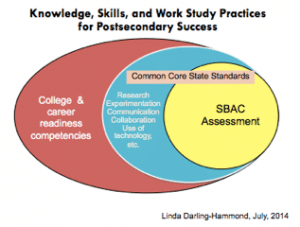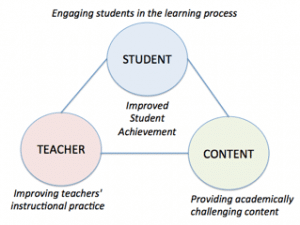Performance Assessment for Competency Education
CompetencyWorks Blog

On Monday August 11, 2014, leaders from our four NH PACE-implementing school districts gathered, along with our partners, Dan French and staff from the Center for Collaborative Education and Scott Marion of the Center for Assessment. PACE stands for Performance Assessment for Competency Education. We are moving forward this year with a demonstration project, to prove that we can advance the transformation of our public education system, in part, by changing our accountability model. We would like to lessen the importance of taking simply the summative Smarter Balanced in the spring of 2015 by establishing a richer array of assessments designed to help us with measuring learning and growth for students, teachers, and schools. We would rather see an assessment system include SBAC at grade spans, as well as complex performance assessments.
We believe that this kind of system will allow us to measure a more complete range of knowledge, skills, and practices, necessary for CCR. Linda Darling-Hammond, Gene Wilhoit, and Linda Pittinger[1] have pictured this range of learning in a recent paper:
Further, one must address all three to increase student learning. So our emphasis is to increase accountability so we might deliver in these three areas. One way to do this is to build a system that enhances student engagement with direct teacher support and pedagogy while simultaneously increasing academic challenge. Of course, much of Dr. Elmore’s work in this area has been through direct professional development with teachers regarding instructional practice through “instructional rounds.”2 Another way we believe this can be done is by putting standards in the hands of students and involving students and teachers deeply in complex projects and performance. These are foundational principles of competency education, where standards are written in bite sized chunks that students can understand, and they are engaged via wise and skilled educators as they connect with learning paths passionately in on-going efforts to demonstrate their mastery of those competencies. Educators who have seen the power of this model first hand also become passionate in this work. We have seen this all around the country. Here in NH, educational leaders from the four districts assembled last Monday, are now building out an accountability model to support this work.
Tuesday through Friday, August 12-15, teachers K-12 from three of the four districts, Sanborn, Epping, and Rochester, held an Assessment Summit with core teams of educators from the districts, focused on work completed in the last year in building and validating performance assessments tied to student competencies, as well as planning for the coming year’s pilot. Much of the work at this point is focused on stretching NH’s graduation level state competencies in English Language Arts, Mathematics, Science, and Work-Study Practices into developmental progressions tied to teaching and learning, K-12, consistent with accepted national standards. This work is being aligned with a performance assessments at all levels, creating a taxonomy of competencies and assessments in and across content areas. Calibration and moderation work is also a major part of the planning and professional development activities.
For further information regarding NH’s plan to build this pilot and scale this system, the “New Hampshire Department of Education College and Career-Ready Accountability Options” document can be found on the Stanford Center for Opportunity Policy in Education website. With time allowable, I hope to update you periodically on the work in progress!
[1]Darling-Hammond, L., Wilhoit, G., & Pittenger, L. (2014). Accountability for college and career readiness: Developing a new paradigm. Education Policy Analysis Archives, 22(86).
[2] Instructional Rounds in Education: A Network Approach to Improving Teaching and Learning. City, Elmore, Fiarman, and Teitel. Harvard Education Press. 2009.
Mr. Leather’s background and experience in Education, Counseling, and Administration in New Hampshire spans three decades. He is the Deputy Commissioner of the Department of Education in New Hampshire, and has also served for 18 years as the Director of the Division of Career Technology and Adult Learning for the Department, overseeing statewide initiatives such as High School Redesign, Extended Learning Opportunities, and Drop Out Prevention, as well as the administration of Vocational Rehabilitation, Adult Education, Career and Technical Education, Tech-Prep, School Guidance and Counseling, Apprenticeship Programs, and Career Development efforts, including Workforce Investment Act coordination for the NHDOE.

